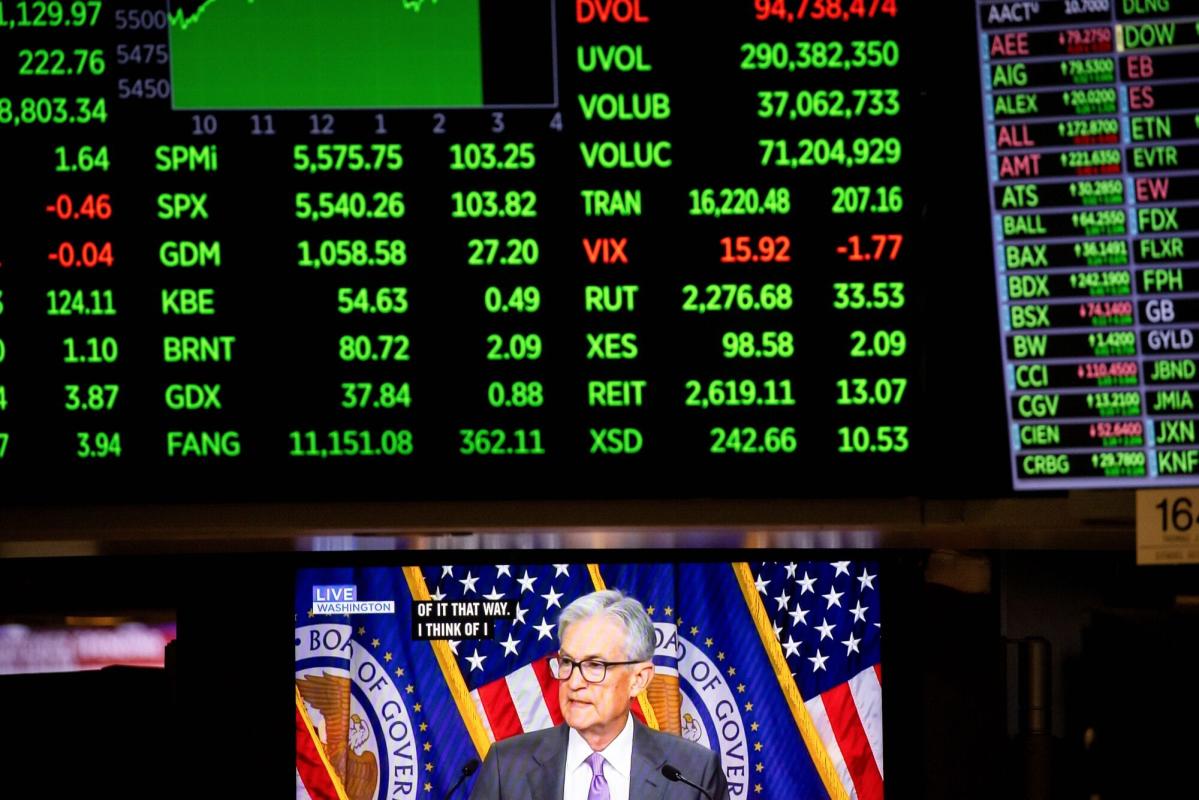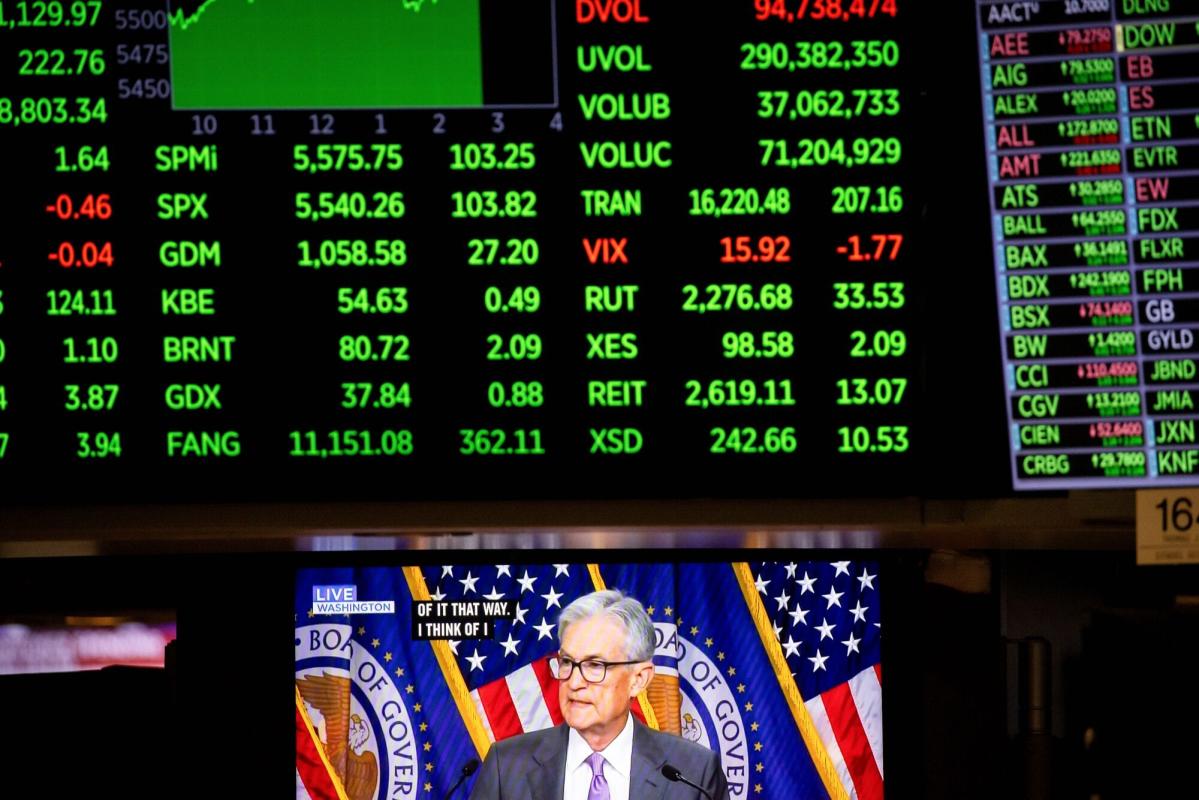
(Bloomberg) — Stocks got hit as bonds rallied after weak economic data spurred concern the Federal Reserve is waiting too long to start cutting rates.
Most Read from Bloomberg
Treasury 10-year yields broke below 4% — with swap traders now fully pricing in three rate reductions this year. In the run-up to the US jobs report, data showed unemployment claims hit an almost one-year high and manufacturing activity shrank by the most in eight months. While policy easing tends to bode well for Corporate America, the economic jitters sent equities lower.
Jerome Powell signaled Wednesday officials are on course to cut rates in September unless inflation progress stalls — citing risks of further jobs weakening. Monthly employment data due Friday will probably add fuel to the debate. Unemployment is now close to triggering a recession indicator developed by former Fed economist Claudia Sahm that has a perfect track record over the last half-century — the “Sahm rule.”
To Neil Dutta at Renaissance Macro Research, the “ongoing deterioration” in economic data has become clear and “until the Fed begins cutting, they are going to look behind the curve.”
“The labor market has been flashing warning signals over the past several months,” said Chris Senyek at Wolfe Research. “History suggests Powell is walking a very fine line on potentially waiting too long to start cutting rates before it’s too late.”
The S&P 500 dropped 1.5%. The Nasdaq 100 sank 2.5%. The Russell 2000 of small caps tumbled 3.5%. Chipmaker Qualcomm Inc. slumped on concern the phone market is recovering more slowly than investors had hoped. Meta Platforms Inc. jumped on a sales beat. Apple Inc. and Amazon.com Inc.’s earnings are due after the closing bell.
Treasury 10-year yields fell five basis points to 3.98%. The pound slid after the Bank of England cut rates and signaled further cautious reductions ahead.
“There is a scenario where a rate cut would be viewed negatively for stocks and that is if the rate cut is coupled with the Federal Reserve voicing concern about the economy,” said George Ball at Sanders Morris. “While that is not a likely scenario, it is not altogether implausible.”
At Capital Economics, Thomas Ryan says further decline in manufacturing raises the risk that US growth will lose momentum in the third quarter — and the plunge in the employment index will add to concern that the “Fed has left it too late to begin loosening policy.”
“The one thing that would cause the Fed to cut more dramatically is if we had a material deterioration in the job market, which is something we are watching closely,” said Chris Zaccarelli at Independent Advisor Alliance.
Powell was asked Wednesday about the “Sahm rule” after he and his colleagues decided to leave their benchmark rate unchanged at the highest levels in more than two decades. He said what policymakers “think we’re seeing is a normalizing labor market,” though if “it starts to show signs that it’s more than that, then we’re well positioned to respond.”
The Fed has been clear on needing more proof of soft inflation prints to cut, but labor-market slowing could lead the Fed to cut rates more aggressively, putting a November cut into play in addition to September and December, according to Oscar Munoz and Gennadiy Goldberg at TD Securities.
“Rates have moved sharply lower in recent days due to a combination of a more dovish Fed, moderating data, and geopolitical risks,” they said. “As such, a weaker reading could reinforce the move lower in rates, exacerbating the bull-steepening trend.”
Fixed-income ETFs took in a historic amount of cash last month as investors pile into the bond market, positioning for the start of a Fed rate-cutting cycle. Bond funds saw inflows of roughly $39 billion in July, the most on record, according to data from Strategas.
To Vail Hartman at BMO Capital Markets, the data won’t be as relevant to expectations for the timing of the first rate cut as it will be to the perceived likelihood the Fed ultimately needs to deviate from the “fine tuning” 25 basis-point quarterly cuts assumption as implied by its projections.
“Said differently, payrolls won’t lead the market to seriously rethink whether a September rate cut is too soon — but the information could easily skew the market-implied path of policy rates toward a more dramatic cutting campaign,” said Hartman.
The Fed is indeed a hot topic this week for global investors trying to time rate cuts. It’s also — unusually — a prominent feature on Corporate America’s post-earnings conference calls.
The words “Federal Reserve” were on track to be mentioned about 380 times on second-quarter calls with analysts, according to a Bloomberg analysis of transcripts of S&P 500 and Stoxx 600 companies. That would be the highest tally ever in the database’s records going back to 2001, if the current pace holds.
A contrarian stock indicator from Bank of America Corp. rose last month, reflecting Wall Street sentiment at elevated levels. Although the gauge remains in “neutral” territory rather than at outright “buy” or “sell” thresholds, ultra bearish attitudes toward equities are no longer a tailwind for upside like last year.
As a risk-on momentum in US stocks showed signs of easing in July, several computer-based systematic strategy funds trimmed their equity exposure. But they may not be done selling just yet.
Commodity trading advisers, or CTAs, cut their equity positions to a two-month low in July, according to Bank of America Corp. Those funds typically use a combination of price-trend signals and volatility to determine allocation. As the stock-market advance hit a snag, CTAs unwound their positions as well.
But to BofA Securities senior equity derivatives research analyst Chintan Kotecha, those CTAs that remain long US stocks should continue to cut their positions, at least in the near-term, as the rally shows signs of stalling.
Corporate Highlights:
-
Eli Lilly & Co. expects its blockbuster weight-loss drug to officially come out of shortage in the US in coming days, the company’s chief executive officer said, threatening the billion-dollar industry of copycat versions of the in-demand drugs.
-
Moderna Inc. plunged after the company reduced its 2024 sales outlook, saying that it expects low uptake for its Covid shot in Europe.
-
Biogen Inc. raised its profit outlook after cost-cuts and faster sales of new drugs boosted second-quarter earnings.
-
Wendy’s Co. trimmed its annual sales guidance following a retreat from US customers in the second quarter, the latest sign that inflation-battered diners are cutting out burger outings.
-
Hershey Co. cut its sales and earnings outlook for the year as shoppers continue to reduce purchases of higher priced chocolates and candies.
-
WW International Inc., better known as WeightWatchers, is laying off employees and cutting costs as blockbuster obesity drugs have decimated its business.
-
R1 RCM Inc. will be acquired by TowerBrook Capital Partners and Clayton, Dubilier & Rice for $8.9 billion in an all-cash deal.
-
Mobileye Global Inc. plummeted after the automotive supplier slashed its annual forecasts, citing several customers dialing back their production plans.
-
Alex Beard, the billionaire former head of oil at Glencore Plc, was charged with corruption by the UK’s top fraud agency, alongside four other ex-employees from the commodities trader.
Some of the main moves in markets:
Stocks
-
The S&P 500 fell 1.5% as of 1:15 p.m. New York time
-
The Nasdaq 100 fell 2.4%
-
The Dow Jones Industrial Average fell 1.5%
-
The MSCI World Index fell 1.6%
-
The Russell 2000 Index fell 3.3%
Currencies
-
The Bloomberg Dollar Spot Index rose 0.3%
-
The euro fell 0.4% to $1.0788
-
The British pound fell 0.8% to $1.2751
-
The Japanese yen rose 0.2% to 149.74 per dollar
Cryptocurrencies
-
Bitcoin fell 3% to $62,641.43
-
Ether fell 3.9% to $3,096.54
Bonds
-
The yield on 10-year Treasuries declined five basis points to 3.98%
-
Germany’s 10-year yield declined six basis points to 2.24%
-
Britain’s 10-year yield declined nine basis points to 3.88%
Commodities
-
West Texas Intermediate crude fell 1.2% to $76.95 a barrel
-
Spot gold fell 0.4% to $2,438.54 an ounce
This story was produced with the assistance of Bloomberg Automation.
Most Read from Bloomberg Businessweek
©2024 Bloomberg L.P.
EMEA Tribune is not involved in this news article, it is taken from our partners and or from the News Agencies. Copyright and Credit go to the News Agencies, email news@emeatribune.com Follow our WhatsApp verified Channel





